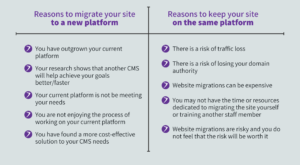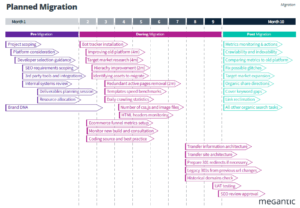What is a Site Migration | Site Migrations 101
10 April 2022 Blog Posts
Welcome to our new series on one of our favourite topics – site migrations!
Megantic have completed over 50 site migrations for eCommerce businesses in niches like furniture, fashion, sporting goods and pet supplies. We have also helped many businesses recover after failed migrations that have led to significant traffic loss and keyword decreases.
Contents
- What is a site migration?
- Why should I migrate my site to a new platform?
- Why should I keep my site on the same platform?
- Which platform should I migrate my site to?
- How long does a site migration take?
What is a site migration?
A website migration refers to moving your website to a new CMS (content management system) or eCommerce platform. Some of the most popular CMS’s that we work with are Neto (now known as Maropost Commerce Cloud), Magento, Shopify, BigCommerce and WooCommerce.
During a site migration it is important to ensure you are keeping your keyword rankings so you can maintain your website traffic and transactions.
“A website migration is the process of transferring and trying to maintain search engine keyword rankings and authority, during a large website restructuring, such a moving CMS platform or updating the existing one”
– Heath Hamilton, Technical Project Manager
Why should I migrate my site to a new platform?
There are many benefits to migrating your site to a new eCommerce platform.
- You may have outgrown your current platform.
- A different CMS may help achieve your goals better or faster.
- Your current platform may not be meeting your needs.
- You may not enjoy the process of working on your current platform.
- You may have found a more cost-effective solution.
Why should I keep my site on the same platform?
Website migrations can be risky.
There is a big risk of traffic losses when you migrate a site. One of our clients came to us with a previous migration that had lost their site 71% in traffic in only one month! A loss of traffic this high can have disastrous implications, including decreased sales, revenue and customer trust in your brand. Luckily we were able to mitigate this and increased our client’s traffic back to the original amount in less than two years.
Website migrations also contain the risk of losing domain authority. Domain authority is a search engine ranking score that predicts how likely it is for a website to rank in search results. Scores differ between various auditing tools, but generally range from 1 to 100, with 100 being a higher likelihood of ranking. DA can be arbitrary and is not a ranking factor by Google, having no real effect on search engine results, but it can be a good indicator of how a website is viewed and ranked alongside competitors.
Website migrations can also be complicated and time consuming, so we highly recommend contacting a professional for your migration.

Which platform should I migrate my site to?
Some of the main website platforms are Neto, Shopify, Magento, BigCommerce and WooCommerce. Most of our clients who are looking to migrate their site, will migrate it to Neto.
Neto has the ability to create an independent menu and category hierarchy, logical URLs and it has an in-built 301 Redirecting Tool. It is also a cost-effective solution considering how vast the platform is, with a relatively simple backend for internal management.
Shopify is very good for its incredible ease-of-use, XML sitemap creation and the ability to create search optimised 301 redirects quickly.
Magento is by far the most extensive and is ideal for larger, multi-store websites. It can be used to build logical URL structures and develop menus and categories with product-sort hierarchies.
BigCommerce has the flexibility to create filters as categories and has powerful internal reporting tools. It works well for companies and enterprises with multiple brick and mortar stores in addition to an online store.
WooCommerce has many customisation options, including the ability to change product prices based on currencies, and is flexible enough to be used by companies in many different industries and niches.

How long does a site migration take?
It typically takes us around 10 months to complete a website migration.
Month 1 is pre-migration. In this stage, we look at everything that will need to be migrated and form a completed project scope. We also have discussions with you to decide on deliverables and the correct resource allocations.
Months 2 through 9 are when the migration is in process. We install a bot tracker, improve the old platform with our 3 stage strategy and transfer as much site and information architecture as possible.
The migration is usually completed by month 10, however this can vary based on a variety of factors. During this post migration stage, we uncover keyword gaps, address historical 301s, reclaim links and ensure the site has correct crawlability and indexability.

Website migrations are time consuming but can be very helpful for a business to improve the overall usability of their website and in turn, increase transactions, revenue and repeat purchases from customers. However, there are risks. Ensure you weigh up the benefits with the potential risks before beginning a website migration, and ensure the company you are working with is trustworthy and has proven results of their success.





